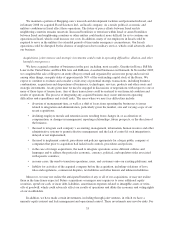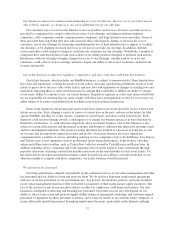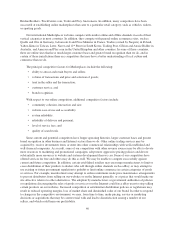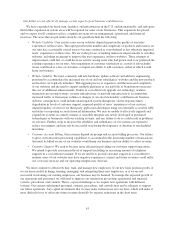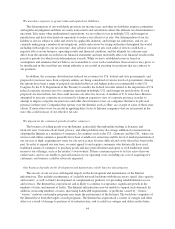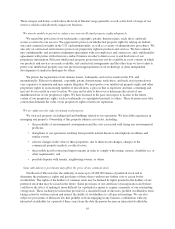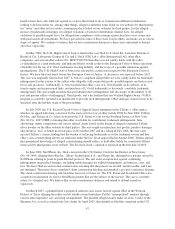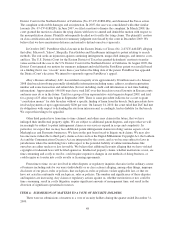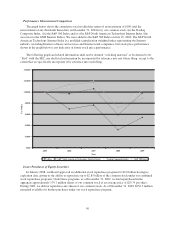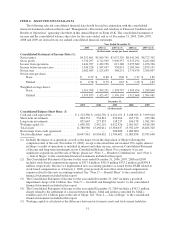eBay 2009 Annual Report Download - page 49
Download and view the complete annual report
Please find page 49 of the 2009 eBay annual report below. You can navigate through the pages in the report by either clicking on the pages listed below, or by using the keyword search tool below to find specific information within the annual report.Conversely, other companies and government agencies have in the past and may in the future allege that our
actions violate the antitrust or competition laws of the U.S. or other countries, or otherwise constitute unfair
competition. Such claims, even if without foundation, typically are very expensive to defend, involve negative
publicity and substantial diversion of management time and effort, and could result in significant judgments
against us.
In several jurisdictions, we have taken actions designed to improve the safety of transactions on our
websites. Beginning in June 2008, we have required users in the UK to offer PayPal as a payment alternative on
most transactions on our localized UK website, and since October 2008, we have required sellers on eBay.com to
accept one or more accepted payment methods (currently PayPal, credit or debit cards processed through Internet
merchant accounts, ProPay, Moneybookers and Paymate) and no longer allow any forms of paper payment,
including checks and money orders, to be listed by sellers in the U.S. for most categories of items. While these
initiatives are intended to improve and make safer our users’ buying experience and/or increase activity on our
sites, certain users may be negatively affected by or react negatively to these changes. We currently face
inquiries from government regulators in various jurisdictions related to such actions. For example, in 2009, the
Reserve Bank of Australia reviewed our policies requiring sellers to offer PayPal as a payment alternative on
most transactions on our localized Australian website and precluding sellers from imposing a surcharge or any
other fee for accepting PayPal or other payment methods. We may face similar inquiries from other government
regulators in the future. Any negative reaction to these changes by our users or government authorities could,
among other things, force us to change our operating practices in ways that could harm our business, operating
results and profitability. In addition, certain competitors may offer or continue to offer free shipping or other
transaction related services, which could be impractical or inefficient for eBay sellers to match. New
technologies may increase the competitive pressures by enabling our competitors to offer a lower cost service.
Although we have established Internet traffic arrangements with several large online services and search
engine companies, these arrangements may not be renewed on commercially reasonable terms or these
companies may decide to promote competitive services. Even if these arrangements are renewed, they may not
result in increased usage of our services. In addition, companies that control user access to transactions through
network access, Internet browsers, or search engines, could promote our competitors, channel current or potential
users to their vertically integrated electronic commerce sites or their advertisers’ sites, attempt to restrict our
access, or charge us substantial fees for inclusion. Search engines are increasingly becoming a starting point for
online shopping, and as the costs of operating an online store continue to decline, online sellers may increasingly
sell goods through multiple channels, which could reduce the number and value of transactions these sellers
conduct through our sites.
PayPal
The markets for PayPal’s product are intensely competitive and are subject to rapid technological change,
including but not limited to: mobile payments, electronic funds transfer networks starting to allow Internet
access, cross-border access to networks, creation of new networks, expansion of prepaid cards, and bill pay
networks. PayPal competes with existing online and offline payment methods, including, among others:
• credit card merchant processors that offer their services to online merchants, including American
Express, Chase Paymentech, First Data, and Wells Fargo; and payment gateways, including
CyberSource and Authorize.net (which has merged with CyberSource);
• money remitters such as MoneyGram, Western Union, Global Payments, Inc. and Euronet;
• bill payment services, including CheckFree, a subsidiary of Fiserv;
• processors that provide online merchants the ability to offer their customers the option of paying for
purchases from their bank account or paying on credit, including Acculynk, Moneta, eBillMe,
Revolution Money (which American Express has acquired) and TeleCheck, a subsidiary of First Data,
or to pay on credit;
41




